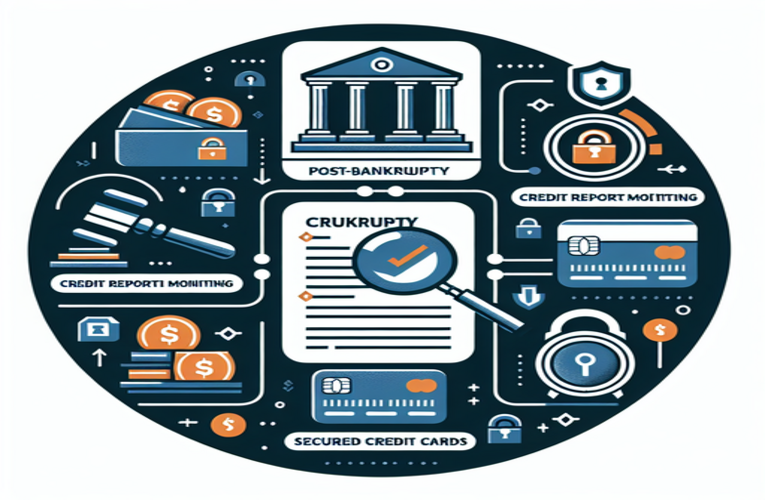Importance of maintaining credit health for entrepreneurs: a guide to enhancing funding opportunities and business relationships
In today’s competitive business landscape, the importance of maintaining credit health for entrepreneurs cannot be overstated, especially for those seeking to secure vital funding for their ventures. For startups and business owners alike, understanding how an optimal credit score influences access to financial resources is crucial for long-term success. A robust credit rating not only increases your chances of obtaining loans but also ensures that you’re presented with favorable terms, lower interest rates, and higher borrowing limits. Recognizing the significance of good credit standing is essential in navigating the financial aspects of entrepreneurship. In this article, we will explore:
- The role of credit health in securing business funding
- How a strong credit score impacts supplier agreements and entrepreneurial relationships
- Effective strategies to enhance and maintain your credit rating
By the end of this article, you’ll gain valuable insights into how a strong credit score can serve as a powerful asset for entrepreneurs, facilitating access to essential capital and fostering reliable partnerships. We’ll also provide practical tips for maintaining and improving your credit health, ensuring your entrepreneurial journey is supported by a solid financial foundation. Let’s dive into the critical elements that define credit health and its impact on entrepreneurial success.
Table of Contents
Significance of Credit Health in Securing Business Funding
Understanding the importance of maintaining credit health for entrepreneurs is paramount, especially when it comes to accessing crucial funding opportunities for business growth and sustainability. A robust credit score is a fundamental indicator of financial integrity and responsibility, serving as a critical determinant when approaching lenders or investors. According to the Small Business Administration, approximately 75% of small business loan applications are influenced heavily by the applicant’s creditworthiness.
- Increased Funding Approval Rates: Entrepreneurs with higher credit scores see approval rates of up to 90% for traditional loans, compared to 30% for those with lower scores.
- Lower Interest Rates and Costs: Businesses with credit scores exceeding 700 often secure loans with interest rates 1.5% to 3% lower than those with scores below 600, resulting in substantial savings over the loan term.
- Access to Diverse Funding Sources: A strong credit profile opens doors to various funding avenues, including venture capital, angel investors, and government grants.
- Higher Credit Limits: Entrepreneurs with excellent credit health are more likely to receive higher borrowing limits, providing greater financial flexibility to invest in growth opportunities.
Moreover, an impressive credit score is indicative of proficient financial management and accountability, enhancing credibility in the eyes of potential investors and partners. When seeking financial support, a stellar credit history provides tangible evidence of dependability and stability, increasing the likelihood that funding sources will endorse business ventures. For instance, a survey by Fundera reveals that 55% of investors consider personal and business credit scores as significant factors in investment decisions.
To maintain and improve credit health, entrepreneurs should:
- Monitor Payment Histories Regularly: Check payment histories for accuracy and consistency, ensuring all payments to suppliers and creditors are timely.
- Manage Credit Utilization Ratio: Keep credit utilization below 30% by efficiently using available credit and avoiding high balances relative to credit limits.
- Verify Credit Reports Frequently: Obtain credit reports from major credit bureaus periodically to ensure the accuracy of all entries and dispute any discrepancies promptly.
- Establish a Diverse Credit Mix: Maintain a healthy balance of different credit types, such as installment loans and revolving credit accounts, to showcase financial versatility.
This diligent approach not only facilitates access to essential funding but also lays a solid financial groundwork for future expansion. By prioritizing credit health maintenance, entrepreneurs position themselves to take advantage of opportunities that can propel their ventures toward sustainable success in a competitive marketplace.
Impact of Credit Health on Supplier Agreements and Business Relationships
For entrepreneurs, recognizing the significance of maintaining credit health is crucial, as it can determine success or failure in today’s competitive business landscape. A strong credit score plays a pivotal role in supplier agreements, establishing a foundation of trust and reliability between businesses and their suppliers. Suppliers meticulously assess credit history before entering contracts, using this information as a key indicator of a company’s financial health and ethical standing.
Benefits of Strong Credit Health in Supplier Relationships
- Negotiating Favorable Contract Terms:
- Businesses with robust credit scores often benefit from advantageous terms, such as extended payment periods and bulk purchase discounts.
- For example, a supplier may offer net-60 payment terms to a business with excellent credit, compared to net-30 for those with lower scores, enhancing cash flow management.
- Access to Premium Products and Services:
- Suppliers may prioritize clients with strong credit health for the allocation of limited or high-demand resources.
- This preferential treatment can lead to early access to new product lines or exclusive service offerings.
- Enhanced Trust and Collaboration:
- Reliable creditworthiness fosters stronger partnerships, enabling collaborative efforts such as joint ventures or co-marketing initiatives.
- A study by the Credit Research Foundation indicates that businesses with higher credit scores are 40% more likely to engage in collaborative projects with suppliers.
- Reduced Costs and Operational Efficiency:
- Strong credit health can lead to a reduced need for prepayments or deposits, freeing up capital for other operational needs.
- Efficient payment processes and mutual trust reduce administrative burdens and streamline supply chain operations.
Industry Statistics and Insights
Research indicates that companies with high credit ratings are able to negotiate terms approximately 15-20% more favorable than those offered to counterparts with lower scores. For instance, a Dun & Bradstreet report highlighted that businesses with excellent credit are 30% less likely to experience supply chain disruptions due to supplier issues.
| Benefit | Description | Example |
|---|---|---|
| Extended Payment Terms | Allows more time for cash flow management before invoices are due. | Securing net-60 or net-90 terms instead of standard net-30. |
| Discount Opportunities | Reduced prices on bulk purchases and exclusive deals. | Receiving a 5-10% discount on orders exceeding certain volume thresholds. |
| Priority in Resource Allocation | Access to limited resources or high-demand products before competitors. | Being the first to receive new technology components critical to production. |
| Collaborative Opportunities | Engaging in joint ventures or strategic partnerships with suppliers. | Co-developing a product line with shared investment and profit. |
By understanding and leveraging the importance of credit health for entrepreneurs, businesses can cultivate strong relationships that enhance operational efficiency and competitiveness. Prioritizing credit health not only builds trust with suppliers but also positions a company as a reliable and valuable partner in the supply chain.
Strategies for Improving Credit Health
In the realm of entrepreneurship, the importance of maintaining credit health for business owners is a critical factor in determining success and sustainability. A robust credit rating not only facilitates access to funding but also improves the likelihood of obtaining advantageous financing solutions necessary for business expansion. Implementing effective strategies to enhance credit health can have a profound impact on an entrepreneur’s ability to secure resources and build a solid financial foundation.
Key Strategies to Enhance Your Credit Score
- Manage Credit Utilization Ratio:
- Keep your credit utilization below 30% by paying down balances and increasing credit limits responsibly.
- For example, if your total available credit is $50,000, aim to keep outstanding balances below $15,000.
- Ensure Timely Payments:
- Implement automated payment systems or set up reminders to avoid missing due dates.
- Consistently paying bills on time positively impacts your payment history, which accounts for 35% of your FICO score.
- Diversify Credit Accounts:
- Maintain a balanced mix of credit types, such as business loans, credit cards, and lines of credit.
- This diversification demonstrates your ability to manage various financial obligations effectively.
- Review Credit Reports Regularly:
- Obtain credit reports from major credit bureaus (Equifax, Experian, TransUnion) to check for inaccuracies or fraudulent accounts.
- The Federal Trade Commission reports that 20% of credit reports contain errors; correcting them can significantly improve your score.
- Avoid Frequent Credit Inquiries:
- Limit the number of new credit applications, as multiple hard inquiries can lower your credit score.
- Consider pre-qualification options that use soft inquiries instead.
- Establish Trade References:
- Build relationships with suppliers who report positive payment experiences to business credit bureaus.
- This can enhance your business credit profile independently of personal credit.
By employing these strategies, entrepreneurs can not only improve immediate financial opportunities but also establish a solid foundation for long-term stability and prosperity. The importance of maintaining credit health for entrepreneurs cannot be overstated, as it greatly influences the trajectory of entrepreneurial endeavors. These practices are fundamental principles that can lead to enhanced credibility, better financing options, and stronger business relationships.
Summary
Here’s a concise summary of the key takeaways from the article:
- Significance of Credit Score: A strong credit score is essential for entrepreneurs as it directly impacts the ability to secure funding, lower interest rates, and higher borrowing limits, thereby enhancing overall financial health.
- Benefits of Maintaining Credit Health:
- Increased funding opportunities and more favorable loan terms, supporting sustainable business growth.
- Ability to negotiate advantageous supplier agreements, including discounts and extended payment terms, improving cash flow management.
- Strengthened business relationships that foster growth and collaboration, enhancing the entrepreneurial ecosystem.
- Enhanced creditworthiness, leading to greater trust from investors and partners.
- Strategies for Credit Improvement:
- Monitor payment histories for accuracy to maintain a positive credit record.
- Keep credit utilization below 30% to ensure a healthy debt-to-income ratio.
- Use automated payment systems for timely payments, reducing the risk of missed or late payments.
- Diversify your credit accounts and review reports regularly for disputes to enhance credit diversity and integrity.
Prioritizing credit health is crucial for unlocking financial opportunities, improving creditworthiness, and creating a stable foundation for long-term success in your entrepreneurial journey.
Questions and Answers
What strategies can entrepreneurs implement to rebuild and enhance their business credit score after experiencing a financial setback?
Entrepreneurs can focus on making timely payments on all business credit accounts, reducing outstanding debts and lowering credit utilization ratios, increasing their business credit limits, and gradually applying for new types of business credit responsibly. These actions collectively help rebuild and improve their business credit score following a financial setback.
How frequently should business owners review their credit reports to maintain optimal credit health?
Business owners should review their credit reports at least once a year to ensure all information is accurate and up-to-date. Regularly monitoring their business credit reports helps identify any potential discrepancies or inaccuracies that could negatively impact their business credit score.
What types of credit accounts are most beneficial for entrepreneurs looking to improve their business credit scores?
A diverse mix of credit accounts is beneficial for enhancing business credit scores. This includes installment loans, such as business auto loans or equipment financing, and revolving credit accounts like business credit cards. Demonstrating the ability to manage various types of credit effectively can positively influence lenders’ perceptions of the business’s creditworthiness.
Are there specific credit monitoring services that entrepreneurs should consider for tracking their business credit?
Yes, entrepreneurs may consider utilizing credit monitoring services tailored for business credit, such as Credit Karma for Business, Experian Business, or TransUnion Small Business. These services offer regular updates, alerts about changes to their business credit reports, and tools to monitor their business credit scores and reports effectively.
What impact does having a co-signer with a strong credit score have on a business loan application?
Having a co-signer with a strong personal or business credit score can significantly enhance the likelihood of loan approval. It may also result in more favorable loan terms, including lower interest rates and higher loan amounts, as the co-signer provides additional assurance to lenders regarding the loan repayment capability.
How can making timely payments influence a business’s negotiation power with suppliers?
Making timely payments consistently establishes a business’s reputation for reliability and financial responsibility. This enhanced reputation can provide leverage during negotiations with suppliers, leading to better payment terms, discounts, or favorable credit arrangements that benefit the business’s cash flow.
Can an entrepreneur’s personal credit score affect their business funding opportunities, and if so, how?
Yes, an entrepreneur’s personal credit score can significantly influence business funding opportunities, especially for startups or small businesses. Lenders often consider the personal credit history of the business owner when evaluating loan applications, as it reflects the owner’s financial responsibility and ability to manage debt.
What steps should entrepreneurs take if they discover errors on their business credit report?
If entrepreneurs identify errors on their business credit report, they should promptly dispute the inaccuracies with the respective credit reporting agency. This involves providing evidence and documentation to support their claims and following up to ensure that the incorrect information is corrected or removed from their business credit profile.
How does the length of a business’s credit history impact its overall credit score?
The length of a business’s credit history plays a crucial role in determining its credit score. A longer history of responsible credit use demonstrates credibility and reliability to lenders, which tends to positively influence the credit score. Establishing and maintaining a prolonged credit history can enhance a business’s creditworthiness over time.
Are there industry-specific credit challenges that entrepreneurs should be aware of when managing their business credit?
Yes, different industries may face unique credit challenges and scrutiny from lenders. Entrepreneurs should understand the specific credit and financial practices prevalent in their industry to effectively navigate these challenges. Being aware of industry-related credit issues can help in mitigating risks and securing favorable financing options tailored to their business sector.



















